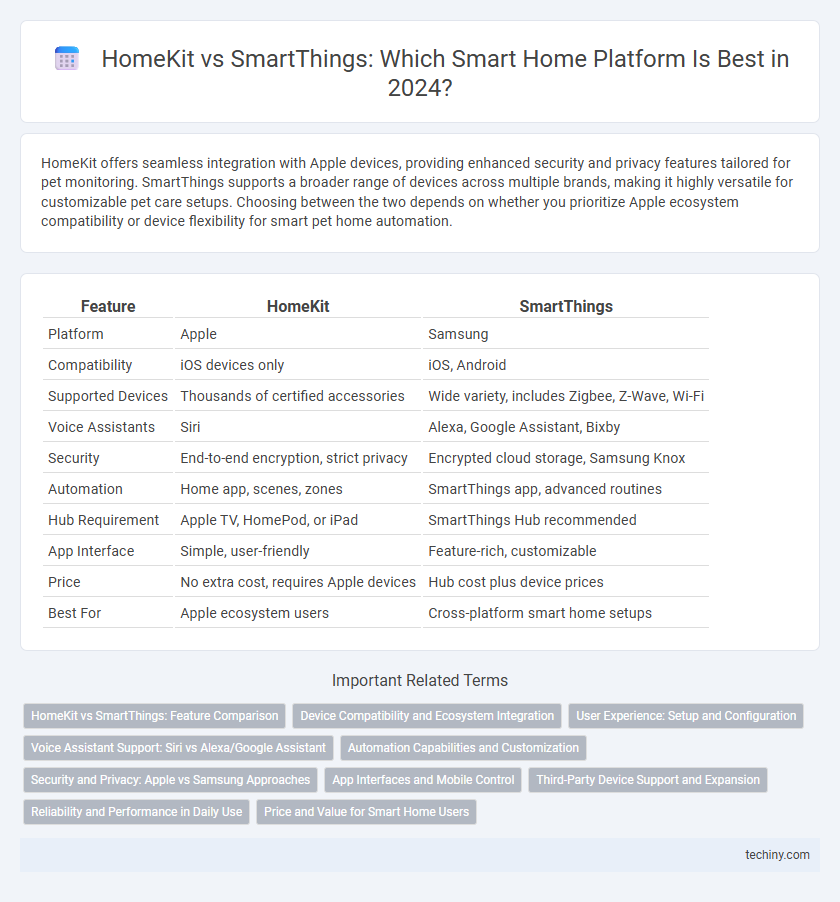HomeKit offers seamless integration with Apple devices, providing enhanced security and privacy features tailored for pet monitoring. SmartThings supports a broader range of devices across multiple brands, making it highly versatile for customizable pet care setups. Choosing between the two depends on whether you prioritize Apple ecosystem compatibility or device flexibility for smart pet home automation.
Table of Comparison
| Feature | HomeKit | SmartThings |
|---|---|---|
| Platform | Apple | Samsung |
| Compatibility | iOS devices only | iOS, Android |
| Supported Devices | Thousands of certified accessories | Wide variety, includes Zigbee, Z-Wave, Wi-Fi |
| Voice Assistants | Siri | Alexa, Google Assistant, Bixby |
| Security | End-to-end encryption, strict privacy | Encrypted cloud storage, Samsung Knox |
| Automation | Home app, scenes, zones | SmartThings app, advanced routines |
| Hub Requirement | Apple TV, HomePod, or iPad | SmartThings Hub recommended |
| App Interface | Simple, user-friendly | Feature-rich, customizable |
| Price | No extra cost, requires Apple devices | Hub cost plus device prices |
| Best For | Apple ecosystem users | Cross-platform smart home setups |
HomeKit vs SmartThings: Feature Comparison
HomeKit offers seamless integration with Apple devices, prioritizing user privacy and secure encryption, while SmartThings supports a broader range of third-party devices and platforms, enhancing compatibility across ecosystems. HomeKit's automation relies heavily on the Apple Home app and Siri voice control, whereas SmartThings provides a more customizable experience through its app and supports voice assistants like Alexa and Google Assistant. Device compatibility and ecosystem flexibility are key differentiators, with HomeKit excelling in security and ease of use, and SmartThings offering greater versatility and broader smart device support.
Device Compatibility and Ecosystem Integration
Apple HomeKit supports a wide range of devices but is primarily optimized for Apple products, ensuring seamless integration with iPhones, iPads, and Macs. Samsung SmartThings offers broader device compatibility across multiple brands and platforms, including Zigbee, Z-Wave, and Wi-Fi, making it more versatile for diverse smart home setups. HomeKit's ecosystem integration emphasizes security and privacy within the Apple environment, while SmartThings provides flexible automation and cross-platform control through Samsung's SmartThings Hub and app.
User Experience: Setup and Configuration
HomeKit offers a streamlined setup process with intuitive configuration through the Apple Home app, emphasizing ease of use and seamless integration with iOS devices. SmartThings provides a more flexible setup that accommodates a wider range of third-party devices, but it can require more time and technical knowledge to fully configure. Both platforms deliver strong user experiences, but HomeKit excels in simplicity, while SmartThings offers greater customization for advanced users.
Voice Assistant Support: Siri vs Alexa/Google Assistant
HomeKit integrates seamlessly with Siri, offering secure, privacy-focused voice control exclusively on Apple devices, ensuring smooth interaction within the Apple ecosystem. SmartThings supports Alexa and Google Assistant, providing broader compatibility across numerous devices and platforms for flexible voice commands in diverse smart home setups. Users prioritizing privacy and Apple-centric usage favor HomeKit with Siri, while those seeking wide device support and cross-platform functionality lean towards SmartThings with Alexa or Google Assistant.
Automation Capabilities and Customization
HomeKit offers seamless automation through the Apple ecosystem, enabling users to create personalized scenes and schedules using the Home app, with strong emphasis on privacy and secure device communication via HomeKit Secure Video and Siri voice control. SmartThings provides a broader range of device compatibility and more advanced customization options, supporting complex automation routines triggered by various sensors, conditions, and Webhook integrations through its SmartThings app and Groovy IDE. While HomeKit prioritizes simplicity and security, SmartThings excels in flexibility and detailed automation workflows for diverse smart home setups.
Security and Privacy: Apple vs Samsung Approaches
Apple HomeKit emphasizes end-to-end encryption and strict app vetting to ensure user data privacy, leveraging on-device processing to minimize cloud exposure. Samsung SmartThings employs cloud-based services with customizable privacy settings but relies more heavily on third-party integrations, which can introduce varying security risks. HomeKit's closed ecosystem offers tighter security control, while SmartThings provides greater flexibility at the potential cost of increased privacy vulnerabilities.
App Interfaces and Mobile Control
HomeKit offers a streamlined app interface through the Apple Home app, providing seamless integration across iOS devices with intuitive control and automation features optimized for iPhone and iPad users. SmartThings features a more versatile app that supports a broader range of third-party devices and platforms, allowing flexible customization and comprehensive remote control via Android and iOS smartphones. Both platforms emphasize mobile control but differ in ecosystem compatibility and user interface design tailored to their respective audiences.
Third-Party Device Support and Expansion
HomeKit offers strong security and seamless integration but supports a more limited range of third-party devices compared to SmartThings, which excels in device compatibility and ecosystem expansion. SmartThings supports a wider variety of brands and protocols such as Zigbee and Z-Wave, enabling users to connect diverse smart devices within one platform. This extensive third-party device support makes SmartThings ideal for users seeking a highly customizable and scalable smart home experience.
Reliability and Performance in Daily Use
Apple HomeKit offers seamless integration with iOS devices, ensuring fast and reliable automation with strict security protocols, making it highly dependable for daily smart home tasks. Samsung SmartThings supports a wider range of third-party devices and offers more customization options, but users may experience occasional latency and connectivity issues. Both platforms deliver strong performance, though HomeKit's optimized ecosystem provides more consistent responsiveness in everyday use.
Price and Value for Smart Home Users
HomeKit offers seamless integration with Apple devices at a premium price, catering to users who prioritize privacy and a unified ecosystem. SmartThings provides a more affordable and flexible option compatible with various brands, delivering greater value for users seeking extensive device variety and customization. Choosing between them depends on budget constraints and the desired balance between ecosystem loyalty and device compatibility.
HomeKit vs SmartThings Infographic

 techiny.com
techiny.com